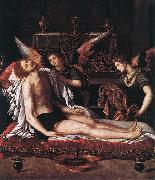Wholesale Oil Painting No Minimum |
|||||||||||
|
|
|||||||||||

|
|||||||||||
|
|
|
||||||||
ALLORI AlessandroItalian Mannerist Painter, 1535-1607 Born in Florence. After the death of his father in 1540 he was brought up and trained in art by a close friend, often referred to as his 'uncle', the mannerist painter Agnolo Bronzino, whose name he sometimes assumed in his pictures. In some ways, Allori is the last of the line of prominent Florentine painters, of generally undiluted Tuscan artistic heritage: Andrea del Sarto worked with Fra Bartolomeo (as well as Leonardo Da Vinci), Pontormo briefly worked under Andrea, and trained Bronzino, who trained Allori. Subsequent generations in the city would be strongly influenced by the tide of Baroque styles pre-eminent in other parts of Italy. Freedburg derides Allori as derivative, claiming he illustrates "the ideal of Maniera by which art (and style) are generated out of pre-existing art." The polish of figures has an unnatural marble-like form as if he aimed for cold statuary. It can be said of late phase mannerist painting in Florence, that the city that had early breathed life into statuary with the works of masters like Donatello and Michelangelo, was still so awed by them that it petrified the poses of figures in painting. While by 1600 the Baroque elsewhere was beginning to give life to painted figures, Florence was painting two-dimensional statues. Furthermore, in general, with the exception of the Contra Maniera artists, it dared not stray from high themes or stray into high emotion. |
||||||||
|
|
||||||||
The Body of Christ with Two Angels
The Body of Christ with Two Angels Painting ID:: 4688 |
Oil on copper, 45 x 39 cm
Museum of Fine Arts, Budapest Oil on copper, 45 x 39 cm Museum of Fine Arts, Budapest |
|||||||
|
|
||||||||
|
Cristofano Allori Italian Baroque Era Painter, 1577-1621 was an Italian portrait painter of the late Florentine Mannerist school. Allori was born at Florence and received his first lessons in painting from his father, Alessandro Allori, but becoming dissatisfied with the hard anatomical drawing and cold coloring of the latter, he entered the studio of Gregorio Pagani (1558-1605) who was one of the leaders of the late Florentine school, which sought to unite the rich coloring of the Venetians with the Florentine attention to drawing. Allori also appears to have worked under Cigoli. His pictures are distinguished by their close adherence to nature and the delicacy and technical perfection of their execution. His technical skill is shown by the fact that several copies he made of Correggio's works were thought to be duplicates by Correggio himself. His extreme fastidiousness limited the number of his works. Several specimens are to be seen at Florence and elsewhere. The finest of his works is his Judith with the Head of Holofernes. It exists in two copies in the Pitti Palace in Florence and in the Queen's Gallery in London. The Body of Christ with Two Angels ca. 1600(1600) Medium Oil on copper cyf |
||||||||
|
|
||||||||
|
Prev Next
|
||||||||
|
|
||||||||
|
Related Paintings to Cristofano Allori :. |
||||||||
|
|
||||||||
|
CONTACT US |

